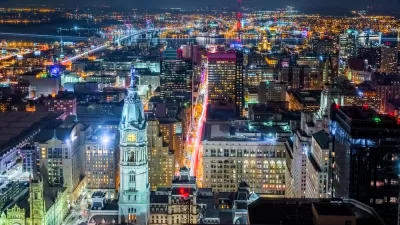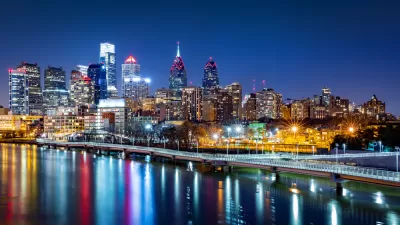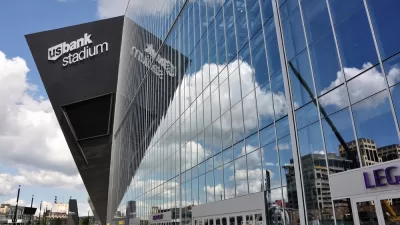Migratory birds are often lured away from their normal paths by the bright lights of cities, with deadly results.

Roughly 100 Philadelphia buildings have signed on to a ‘lights out pledge’ aimed at preventing migratory birds from deviating from their migration paths and striking buildings, reports Bridget Reed Morawski in Next City. The Lights Out Philly program was developed over decades by Keith Russell and Audubon Mid-Atlantic, who tried to draw attention to the issue but had little luck until a massively publicized bird strike event in 2020.
“While light pollution initially draws birds into the city, it’s the combined effect of an abundance of lights and the resulting glare of windows and other reflective glasses that makes it hard to safely navigate — if those surfaces haven’t been modified with bird deterrent films or treatments, that is,” the article explains. “To help reduce migratory bird strikes and deaths, programs in Pittsburgh, Houston and Greensboro, N.C., and other cities across the country have focused on light pollution to encourage residents, businesses and municipalities to shut off their lights during late-night hours during typical spring and fall migration periods.”
These programs seem to have a powerful effect. “According to a 2021 study published in the Proceedings of the National Academy of Sciences, “decreasing lighted window area [to minimum levels historically recorded] could reduce bird mortality by ∼60%” at a large Chicago building.”
FULL STORY: How Mass Bird Death In Philadelphia Catalyzed A Local Lights-out Program

Planetizen Federal Action Tracker
A weekly monitor of how Trump’s orders and actions are impacting planners and planning in America.

Maui's Vacation Rental Debate Turns Ugly
Verbal attacks, misinformation campaigns and fistfights plague a high-stakes debate to convert thousands of vacation rentals into long-term housing.

San Francisco Suspends Traffic Calming Amidst Record Deaths
Citing “a challenging fiscal landscape,” the city will cease the program on the heels of 42 traffic deaths, including 24 pedestrians.

Amtrak Rolls Out New Orleans to Alabama “Mardi Gras” Train
The new service will operate morning and evening departures between Mobile and New Orleans.

The Subversive Car-Free Guide to Trump's Great American Road Trip
Car-free ways to access Chicagoland’s best tourist attractions.

San Antonio and Austin are Fusing Into one Massive Megaregion
The region spanning the two central Texas cities is growing fast, posing challenges for local infrastructure and water supplies.
Urban Design for Planners 1: Software Tools
This six-course series explores essential urban design concepts using open source software and equips planners with the tools they need to participate fully in the urban design process.
Planning for Universal Design
Learn the tools for implementing Universal Design in planning regulations.
Heyer Gruel & Associates PA
JM Goldson LLC
Custer County Colorado
City of Camden Redevelopment Agency
City of Astoria
Transportation Research & Education Center (TREC) at Portland State University
Jefferson Parish Government
Camden Redevelopment Agency
City of Claremont





























